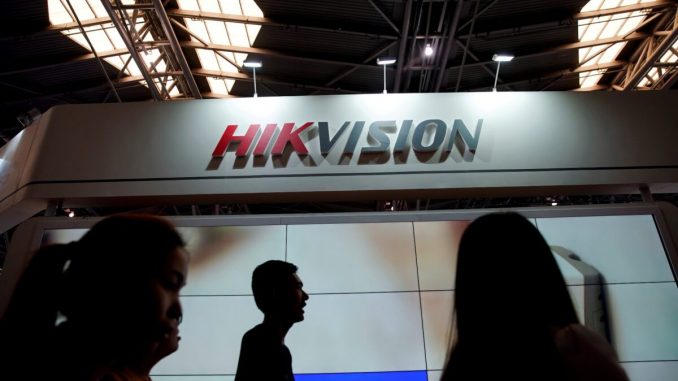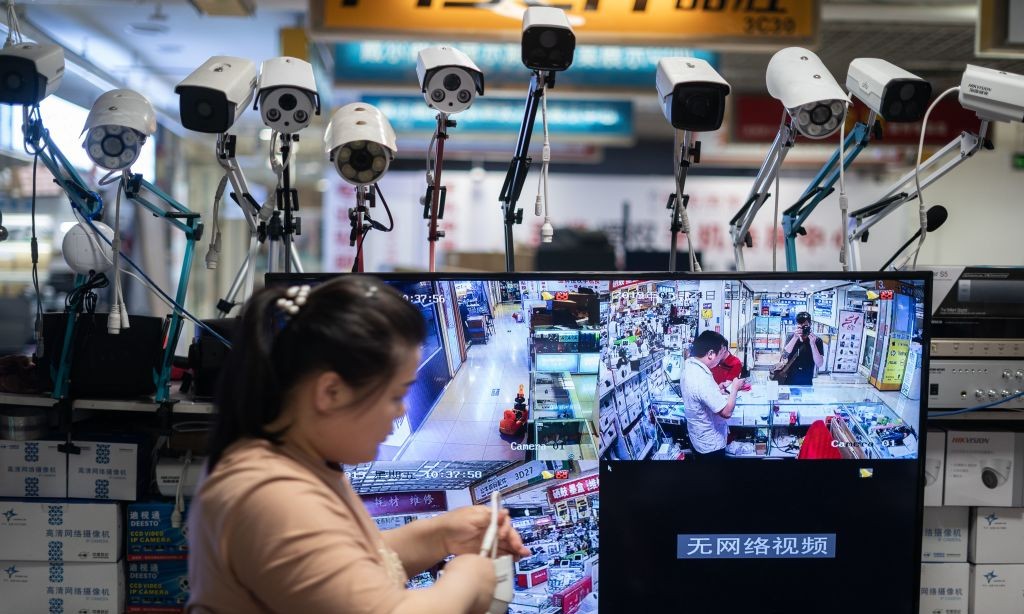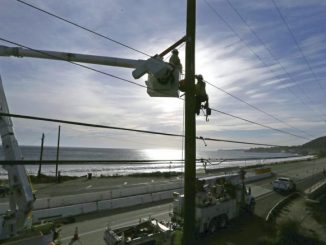
Commentary
A soldier, kneeling on a mountainside, tests a Hikvision drone-jamming rifle in March. Hikvision’s website carried a report, based on a joint study with weapons experts and commanders of the People’s Liberation Army (PLA), detailing how its technology could add functionality to China’s tanks, missiles, and artillery. According to surveillance technology experts IP Video Market (IPVM), Hikvision “advertised dozens of machine-learning jobs at a military police base in Xinjiang, which banned Uyghurs from applying.”
When the Wall Street Journal contacted Hikvision for comment recently, “The report was taken down from Hikvision’s website for several days this month,” according to the Journal. A Hikvision spokesman told the Journal, “Not now, and not ever, has Hikvision conducted research and development work for Chinese military applications.” As should be clear from the above, that’s a lie. And, the company is deeply linked to the Chinese Communist Party (CCP) and state apparatus, which is inextricably networked with its military.
Hikvision, founded in 2001, has its headquarters in Hangzhou, China. It employs over 42,000 people, has annual revenues of almost $10 billion, and a market capitalization of $96 billion. It grew from a Chinese government lab. Hikvision’s largest shareholder is a subsidiary of China Electronics Technology Group Corp (CETC), a state-owned conglomerate.
Some Hikvision cameras can see through fog and pollution, and have night-vision, heat-map, artificial intelligence, and license-, facial-, and behavior-recognition technologies. Some are explosion-proof, mounted on drones or the undercarriages of vehicles for their surveillance, or alert authorities to large crowds or protests. One is equipped with microphones to automatically zero-in on noise in its vicinity.
The Department of Homeland Security flagged Hikvision for a cybersecurity loophole in 2017 that made approximately 200 camera models easily accessible to hackers. Up to tens of millions were shipped, according to an estimate by IPVM.
Yet, America is full of Hikvision products, including security cameras for use in businesses, residences, and by police departments. Hikvision sells its rebranded products through U.S. distributors, meaning that many buyers have no idea that they are purchasing from an insecure Chinese company.
Not only do Hikvision cameras surveil America and its allies, but the company hires Americans and Canadians for its research and development. Two such offices opened in Montreal and Silicon Valley in 2017. Local politicians trying to increase jobs in their communities probably didn’t complain much when Hikvision dangled plans to hire 800 workers in North America by 2022. We sure do sell ourselves cheap.
While the U.S. General Services Administration removed Hikvision from its $66 billion in procurement offerings to the U.S government in 2017, and a U.S. military base removed Hikvision cameras from a Missouri military base recently, it is unclear whether or not the cameras continue in other sensitive locations. The Memphis police used them for street surveillance, and Hikvision cameras watched over electronics in America’s embassy in Kabul until IPVM discovered and published the U.S. procurement order. Apparently government purchasers had not notified State Department security officials, and our Indymedia is doing a better job than the Federal government of finding (and thus encouraging the stripping out of) China’s wiring in our sensitive government installations.
If America wants good cybersecurity against China, our government is going to have to step up its game. The same applies to our allies, as Hikvision is the world’s biggest supplier of video-surveillance equipment globally. French airports, an Irish port, and sites in Iran and Brazil used Hikvision. In 2016, Hikvision purchased Britain’s Pyronix, an intrusion-alarm specialist, for just €16 million. Hikvision’s global market share of surveillance equipment grew from 8 percent in 2012, to 21.4 percent in 2016.

Hikvision’s largest shareholder is Hong Kong billionaire Gong Hongjia, and some of its executives are Communist Party members who CETC, Hikvision’s main state-owned shareholder, also employs. Mr. Gong provided capital for Hikvision’s founding, along with a government-backed lab that initially took a 51 percent controlling share. The company gets huge Chinese government contracts to surveil cities and events, including $1.2 billion worth of “safe city” contracts in Chongqing, population 31 million. Do you feel safer as a result? I don’t.
In 2017, Hikvision’s Pu Shiliang held dual leadership positions as both the company’s head of research, and as a leader in a Hangzhou lab run by China’s police force, the Ministry of Public Security. The goal of China’s increasing surveillance state is to identify lawbreakers and influence behavior, and Hikvision is its enabler.
The U.S. Defense Department no longer purchases from Hikvision, and designated the company on its military list, preventing Americans from investing in its securities. A 2018 law bars the U.S. government from purchasing goods and services from the company, and the Commerce Department blacklisted Hikvision and other Chinese AI companies in 2019. But as Hikvision products continue to creep into our homes and businesses through rebranding, these reforms do not go far enough.
The 18th-century British philosopher Jeremy Bentham, who designed a “panopticon” in which a single guard could surveil an entire prison ranged in a circle around him, would have recognized present-day China as the dystopian development of his prison reform, applied to those outside the prison walls. China today is that reverse-panopticon, in which the intellectual prison of the CCP surveils the world.
If Hikvision can lie about its ties to the Chinese military, other conglomerates from China can too. Huawei, Xiaomi, TikTok, Zoom, Alibaba, and State Grid are all China-linked technology companies that branch into our homes, businesses, and even government offices. As they can rebrand their products and components for sale in our public and private spaces, consumers and government procurement experts are not always aware that with their uninformed consumer choices, they may be opening the door to China’s police state.
That should change, with mandated warning labels on all technology products that include components or software from China. U.S. and allied governments must take a tougher stand against China’s big tech, to ensure our privacy, cybersecurity, and the future of democracy.
Anders Corr has a BA/MA in political science from Yale University (2001) and a Ph.D. in government from Harvard University (2008). He is a Principal at Corr Analytics Inc., Publisher of the Journal of Political Risk, and has conducted extensive research in North America, Europe, and Asia. He authored “The Concentration of Power” (forthcoming 2021) and “No Trespassing,” and edited “Great Powers, Grand Strategies.”
Views expressed in this article are the opinions of the author and do not necessarily reflect the views of The Epoch Times.





Be the first to comment